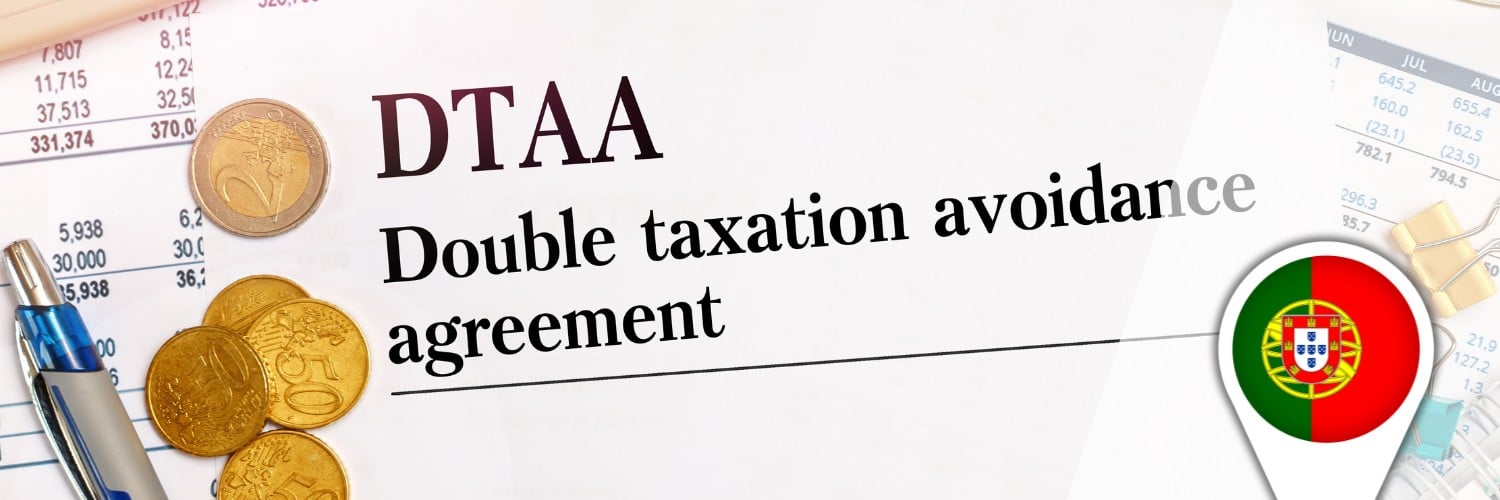Tax Implications for US Expats

Relocating to Portugal as a US citizen offers many opportunities, from experiencing a rich cultural heritage to enjoying a favorable climate and a high quality of life. However, with this move comes the responsibility of navigating complex tax obligations in both the US and Portugal.
First and foremost, as a US citizen, you are subject to global taxation, meaning you must report your worldwide income to the IRS, no matter where you reside. Concurrently, establishing residency in Portugal means you will also be subject to Portuguese tax laws. This dual obligation can seem daunting, but you can manage your tax responsibilities effectively with the proper knowledge and planning.
This is just one of the implications you need to consider when moving to Portugal, and for that reason, we put together the comprehensive guide to the tax landscape for US expats in Portugal below. Besides the intricacies of the dual tax obligations, we will explore the benefits of the Double Taxation Agreement between the US and Portugal, as well as the specifics of the Portuguese tax system. Additionally, we will look into the Non-Habitual Resident (NHR) regime, which the Portuguese government has implemented to offer significant tax advantages for new residents. Lastly, we will provide practical tax planning tips to help you optimize your tax situation.
This guide aims to equip you with the necessary knowledge to navigate the tax implications seamlessly, ensuring you can fully enjoy your new life in Portugal while remaining compliant with both US and Portuguese tax laws.
Portugal Visas & Immigration
We Can Help!
#1 Contact us to get a free quote, or
#2 Schedule a Consultation now.
Dual Tax Obligations for US Citizens Living in Portugal

As a US citizen living in Portugal, you are subject to the tax laws of both the United States and Portugal. This dual tax obligation exists because the US requires citizens to report and pay taxes on their worldwide income regardless of where they live, while Portugal taxes its residents on their global income.
Navigating dual tax obligations as a US citizen living in Portugal requires careful planning and understanding of both countries’ tax laws. Utilizing the foreign-earned income exclusion, foreign tax credits, and benefits provided under the Double Taxation Agreement can help mitigate the impact of being taxed by both the US and Portugal.
Let’s break this into the US Tax Obligations and Portuguese Tax Obligations
- US Tax Obligations
Understanding your US tax obligations is crucial when living abroad as a US citizen. As we mentioned, despite residing in Portugal, you must adhere to US tax laws, which include reporting your worldwide income and meeting additional filing requirements. Here’s a comprehensive look at what you need to know about your US tax responsibilities while living in Portugal.
Global Income Reporting:- Filing Requirements: US citizens must file an annual tax return with the IRS, reporting their worldwide income. This includes wages, dividends, interest, rental income, and any other income earned globally.
- Foreign Earned Income Exclusion (FEIE): To mitigate double taxation, US citizens can exclude a certain amount of foreign earned income from US taxation (up to $126,500 for the 2024 tax year – this amount is adjusted annually for inflation, so it is crucial to confirm the current limit every year). To qualify, you need to either pass the physical presence test or establish bona fide residence.
Foreign Tax Credit: You can claim a credit for taxes paid to Portugal on your US tax return. This credit reduces your US tax liability and helps prevent double taxation on the same income. The amount of the credit is generally limited to the amount of US tax attributable to your foreign income. To claim the foreign tax credit, you must file Form 1116 with your US tax return.
Portugal Visas & Immigration
We Can Help!#1 Contact us to get a free quote, or
#2 Schedule a Consultation now.
Additional Reporting Requirements:
- FBAR (FinCEN Form 114): If you have qualifying foreign financial assets exceeding $10,000 at any time during the calendar year, you must file a Foreign Bank Account Report (FBAR). This includes bank accounts, brokerage accounts, mutual funds, and other financial accounts.
-
FATCA (Form 8938): Under the Foreign Account Tax Compliance Act (FATCA), you must report specified foreign financial assets if they exceed certain thresholds ($200,000 on the last day of the year or $300,000 at any time during the year for single filers living abroad). Form 8938 is filed with your annual tax return.
- Portuguese Tax Obligations
As a Portuguese tax resident, you’ll be subject to local tax laws. To be considered a tax resident of Portugal, you must spend more than 183 days in the country during a fiscal year or maintain a permanent residence as of December 31 each year. Like US Citizens, Portuguese tax residents are also taxed on their worldwide income, including earnings from outside Portugal.
Here’s an overview of the critical aspects of the Portuguese tax system that US expats need to know.
Portuguese Income Tax Rates:
- Progressive Rates: Portugal has progressive income tax rates ranging from 13.25% to 48%, depending on your income level. Additional surcharges may apply to higher incomes
- Social Security: If employed in Portugal, you will generally be subject to Portuguese social security contributions. However, the US and Portugal have a Totalization Agreement to coordinate social security coverage and benefits, avoiding dual contributions.
- Non-Habitual Resident (NHR) Regime: The NHR regime in Portugal is designed to attract professionals in scientific research, innovation, and other high-value jobs. The key benefits of the NHR status include:
- 20% flat tax rate on personal income for eligible professions – compared to the general individual income tax rates in Portugal, this 20% flat tax rate is particularly advantageous (as an example, as of 2024, people earning between $12,650 and $17,930 per year, already pay a 23% income tax)
- Exemptions from taxes on passive income, including dividends, interest, royalties, capital gains, rental income from real estate outside Portugal, and earnings from employment in other countries.
- Eligible roles that qualify for the NHR Status:
- Educational and Scientific Roles:
- Higher education professors and researchers in national science and technology entities.
- Governing bodies of recognized technology and innovation centers.
- Incentivized Organizations:
- Board members of organizations with tax incentives for investments over €3 million.
- Professionals in entities benefiting from the Investment Promotion Tax Regime (RFAI).
- Professionals in companies exporting at least 50% of their turnover.
- R&D personnel eligible for SIFIDE tax incentives.
- Start-Up Positions:
- Employees of start-ups certified under Portuguese law, defined as:
- Less than 10 years old.
- Fewer than 250 employees.
- Less than €50 million turnover.
- Not owned by a large company.
- Based in Portugal or with more than 25 employees.
- Innovative with VC financing or investment from Banco Português de Fomento.
- Employees of start-ups certified under Portuguese law, defined as:
- Educational and Scientific Roles:
Double Taxation Agreement (DTA)

To prevent double taxation, the US and Portugal have a Double Taxation Agreement. The DTA provides mechanisms for tax credits and exemptions, ensuring that income is not taxed twice. For instance, if you pay taxes on your income in Portugal, you can claim a credit for those taxes on your US tax return (FEIE mentioned above).
The DTA also specifies which country has the primary right to tax particular types of income, such as dividends, interest, and royalties.
Portugal Visas & Immigration
We Can Help!
#1 Contact us to get a free quote, or
#2 Schedule a Consultation now.
Tax Planning Tips
Relocating to Portugal as a US citizen involves navigating a complex landscape of tax obligations in both countries. Effective tax planning is essential for ensuring compliance and optimizing your financial situation. From understanding residency rules and leveraging tax benefits like the Non-Habitual Resident (NHR) regime to keeping detailed records and staying informed about changing laws, these tips will help you make the most of your move:
– Professional Advice: Consult with tax professionals experienced in both US and Portuguese tax laws to ensure compliance and optimize your tax situation.
– Record Keeping: Maintain detailed records of your income, expenses, and tax payments in both countries.
– Stay Informed: Tax laws and regulations are subject to change. It is important to stay updated on any modifications in US and Portuguese tax laws that may impact your tax situation. Regularly consulting with your tax advisor will help ensure you remain compliant and can take advantage of any new benefits.
Frequent Questions

1. Do US citizens need to file taxes if they live in Portugal?
Yes, US citizens must report their worldwide income to the IRS regardless of where they reside.
2. What is the D7 Visa?
The D7 Visa is for those with sufficient passive income to support themselves in Portugal, allowing US retirees to reside there.
3.What is the Foreign Earned Income Exclusion (FEIE)?
The FEIE allows US citizens to exclude a certain amount of foreign-earned income from US taxes (up to $126,500 for 2024).
4. What is the Foreign Tax Credit?
The Foreign Tax Credit allows US citizens to claim a credit for taxes paid to Portugal, reducing US tax liability and preventing double taxation.
5. What is FBAR?
FBAR (FinCEN Form 114) requires reporting foreign financial accounts exceeding $10,000 in value at any time during the year.
6. What is FATCA?
FATCA (Form 8938) mandates reporting specified foreign financial assets if they exceed certain thresholds.
7. When are you considered a Portuguese tax resident?
Spending more than 183 days in Portugal during a fiscal year or maintaining a permanent residence there by December 31 makes you a tax resident.
8. What are Portuguese income tax rates?
Portuguese income tax rates range from 13.25% to 48%, depending on income level.
9. What is the Non-Habitual Resident (NHR) regime?
The NHR regime offers significant tax advantages, including a 20% flat tax rate on eligible income and exemptions on certain foreign income.
10. Who qualifies for the NHR status?
Professionals in high-value jobs, educational and scientific roles, start-up employees, and those in incentivized organizations can qualify for NHR status.
11. How does the Double Taxation Agreement (DTA) help US expats?
The DTA prevents double taxation by allowing tax credits and exemptions, ensuring income is not taxed twice.
12. What are the US tax filing requirements for expats?
US citizens must file an annual tax return, reporting worldwide income, and meet additional filing requirements like FBAR and FATCA.
13. What is the Foreign Account Tax Compliance Act (FATCA)?
FATCA requires US taxpayers to report specified foreign financial assets if they exceed certain thresholds.
14. What are the tax implications of the D7 Visa?
D7 Visa holders must comply with both US and Portuguese tax laws, reporting income to both tax authorities.
15. How can expats reduce their tax liability in the US?
Utilizing the FEIE, Foreign Tax Credit, and benefits under the DTA can help reduce US tax liability.
16. What is a Totalization Agreement?
It coordinates social security coverage and benefits between the US and Portugal, avoiding dual contributions.
17. What is the tax rate under the NHR regime?
The NHR regime offers a 20% flat tax rate on eligible income.
18. What types of income are exempt under the NHR regime?
Passive income like dividends, interest, royalties, and rental income from outside Portugal can be exempt under NHR.
19. What are some tax planning tips for US expats?
Consult with tax professionals, maintain detailed records, and stay informed about changing tax laws in both countries.
20. How can expats navigate Portuguese bureaucracy?
Hiring local attorneys or relocation experts can help with legal requirements and paperwork.
Portugal Visas & Immigration
We Can Help!
#1 Contact us to get a free quote, or
#2 Schedule a Consultation now.

